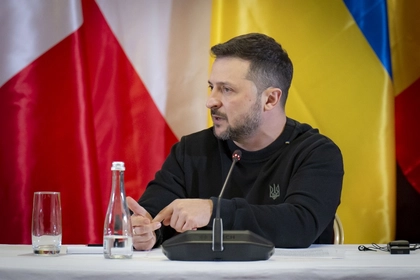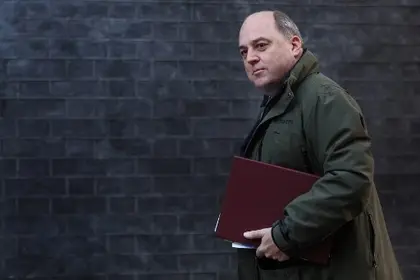After Russia’s recent drone attacks on Kyiv, including on energy targets, U.K. Defense Secretary Ben Wallace made a hurried journey to Washington on Oct. 18 to meet with his U.S. counterpart.
President Zelensky announced on Oct. 18 that about a third of Ukraine’s power plants had been damaged the previous week and warned his people of an arduous winter to come as Moscow changes its war tactic to strike infrastructure.
JOIN US ON TELEGRAM
Follow our coverage of the war on the @Kyivpost_official.
“Since Oct. 10, [a total of] 30 percent of Ukraine’s power stations have been destroyed, causing massive blackouts across the country,” the president stated on Twitter. He added that there was “no space left for negotiations” with Russian President Vladimir Putin’s regime.
Following this announcement, Wallace, together with U.S. Secretary of Defense Lloyd Austin spoke about “our two nations’ support for Ukraine,” according to Pentagon spokesman Brigadier General Patrick Ryder.
It was revealed after the conference that the West would send more missiles to Ukraine to help the country defend itself against the swarm of Iranian drones launched by Russia.
Several areas of the Ukraine remain without power as Moscow’s forces continue to bombard Ukraine’s energy infrastructure and destroy numerous power plants.
According to reliable reports, three people perished as Russian strikes hit a thermal power plant in Kyiv three times, causing heavy black smoke to rise from the city’s Desnianskyi district in the north.

Zelensky Criticizes G20’s Weak Position on Russian Invasion
Around 8.30 a.m. on Oct. 18, Russian forces launched eight rockets at Kharkiv from the city of Belgorod. As a result, hospitals in the western Ukrainian city of Zhytomyr are operating on backup power.
Russian forces’ destruction of power plants is already having an effect on the nation, and there is a sense it will only get worse. The upcoming winter in Ukraine looks increasingly colder according to a recent article by British newspaper The Guardian.
The article claims that while the repeated Russian bombardments of Kyiv and other major cities have resulted in human deaths and carnage, the true effects on the country’s energy supply have not yet been properly assessed.
You can also highlight the text and press Ctrl + Enter






